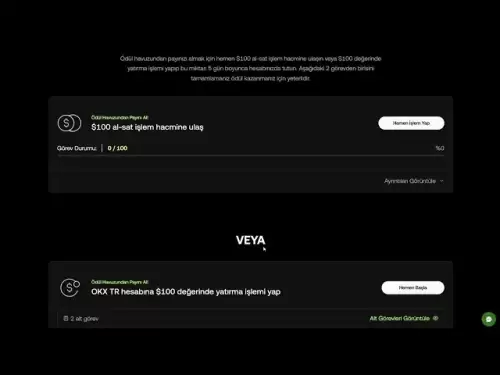-
 Bitcoin
Bitcoin $119300
1.07% -
 Ethereum
Ethereum $3730
3.87% -
 XRP
XRP $3.235
0.29% -
 Tether USDt
Tether USDt $1.000
0.00% -
 BNB
BNB $783.5
1.88% -
 Solana
Solana $188.7
0.25% -
 USDC
USDC $0.0000
-0.01% -
 Dogecoin
Dogecoin $0.2399
-0.44% -
 TRON
TRON $0.3157
2.37% -
 Cardano
Cardano $0.8254
1.94% -
 Hyperliquid
Hyperliquid $42.83
0.14% -
 Stellar
Stellar $0.4372
3.21% -
 Sui
Sui $3.859
4.91% -
 Chainlink
Chainlink $18.53
3.53% -
 Hedera
Hedera $0.2464
0.01% -
 Bitcoin Cash
Bitcoin Cash $519.8
2.46% -
 Avalanche
Avalanche $24.24
2.17% -
 Litecoin
Litecoin $113.7
0.73% -
 UNUS SED LEO
UNUS SED LEO $8.990
0.30% -
 Shiba Inu
Shiba Inu $0.00001390
0.21% -
 Toncoin
Toncoin $3.188
1.49% -
 Ethena USDe
Ethena USDe $1.001
0.02% -
 Polkadot
Polkadot $4.090
-0.91% -
 Uniswap
Uniswap $10.40
4.08% -
 Monero
Monero $326.6
3.12% -
 Bitget Token
Bitget Token $4.627
-0.42% -
 Pepe
Pepe $0.00001281
0.76% -
 Dai
Dai $1.000
0.01% -
 Aave
Aave $291.6
0.98% -
 Cronos
Cronos $0.1269
7.26%
How to ensure that the generated Ethereum wallet address is unique?
Ethereum addresses, generated via cryptographic hashing, are virtually guaranteed unique; user error in copying addresses, not system flaws, is the typical cause of apparent duplicates.
Mar 12, 2025 at 02:51 am
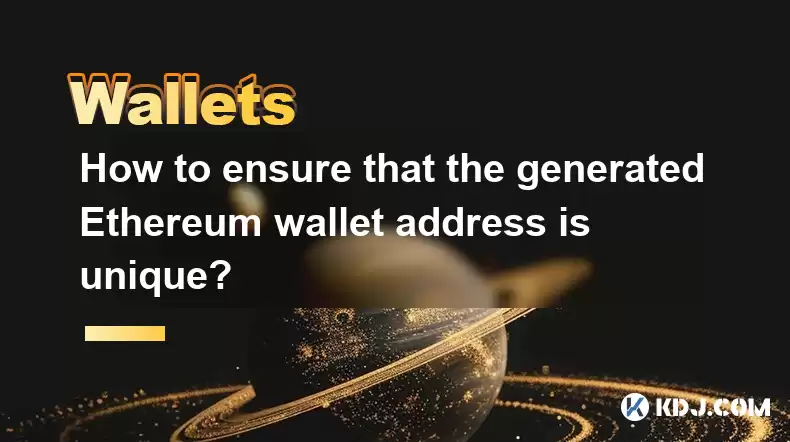
Key Points:
- Ethereum wallet addresses are inherently unique due to the cryptographic processes used in their generation.
- No two addresses can ever be identical, barring extremely improbable collisions.
- The uniqueness is guaranteed by the underlying cryptographic hashing algorithms.
- User error in copying or pasting addresses is the most common source of "non-unique" address issues.
- Proper wallet software and careful handling are crucial for maintaining address uniqueness.
How to Ensure That the Generated Ethereum Wallet Address is Unique?
The fundamental question of how to ensure a unique Ethereum wallet address boils down to understanding the underlying technology. Ethereum addresses are not randomly generated; they are derived from a user's public key through a cryptographic hashing function (specifically, Keccak-256). This process ensures that, for all practical purposes, every unique public key generates a unique address. The probability of two different keys producing the same address is astronomically low, effectively guaranteeing uniqueness.
The uniqueness of an Ethereum address stems directly from the properties of elliptic curve cryptography (ECC), which underpins the generation of public and private keys. Each private key, a randomly generated number, results in a unique corresponding public key. This public key, then, is transformed into the Ethereum address through the Keccak-256 hashing algorithm. The algorithm's deterministic nature means the same input (public key) always produces the same output (address).
Therefore, you don't actively "ensure" uniqueness; it's a built-in feature of the system. Your role is to use reputable wallet software that correctly implements these cryptographic functions. Using faulty or compromised software could theoretically lead to issues, but this is exceptionally rare and points to a software bug rather than a flaw in the address generation process itself.
Many users mistakenly believe they need to check for address uniqueness. This is unnecessary. The only way to create a non-unique address would be to somehow generate the exact same private key twice – an event with a probability so infinitesimally small as to be practically impossible. The randomness inherent in key generation prevents this from happening.
The most common source of apparent address duplication is human error. Carelessly copying and pasting an address can introduce errors, leading to funds being sent to the wrong recipient. Always double-check addresses before initiating any transactions. Consider using QR codes or address verification tools to minimize the risk of human error.
Using a reputable and well-maintained Ethereum wallet is paramount. Choose established wallets with a strong reputation and a proven track record of security. These wallets typically employ robust security measures to protect against vulnerabilities that could potentially affect address generation.
Here are some best practices to minimize the risk of address-related problems:
- Use a trusted wallet: Download your wallet software only from official websites. Avoid unofficial sources or modified versions.
- Verify addresses carefully: Always double, and even triple-check, the address before sending or receiving funds.
- Utilize QR codes: Scanning a QR code is often a more secure way to transfer funds, reducing the risk of manual typing errors.
- Use a hardware wallet: Hardware wallets offer an extra layer of security, protecting your private keys from software vulnerabilities.
- Regularly back up your wallet: Losing access to your wallet could mean losing your funds. Ensure you have a secure backup.
Addressing the issue of "non-unique" addresses often comes down to user error and not inherent flaws in the address generation process itself. The core cryptographic methods ensure that each generated address is, for all intents and purposes, unique. Focusing on secure practices and using reputable tools is the best approach to prevent problems.
The process of generating an Ethereum address is complex, but the underlying principle is straightforward: a unique private key leads to a unique public key, which in turn leads to a unique address through a deterministic hashing function. This ensures that each address is virtually guaranteed to be unique. The probability of two different private keys generating the same address is incredibly small.
Frequently Asked Questions:
Q: Can I generate multiple Ethereum addresses from the same private key?
A: No. Each private key corresponds to a single public key, and therefore a single Ethereum address. Trying to derive multiple addresses from the same private key will result in the same address being generated repeatedly.
Q: What happens if I accidentally use the same address twice?
A: There is no technical issue with using the same address multiple times. It’s perfectly safe to reuse an Ethereum address. The funds received will simply accumulate in that address.
Q: How can I be absolutely certain my address is unique?
A: You don't need to "check" for uniqueness. The cryptographic process inherently guarantees uniqueness. The focus should be on preventing human error during address input and output.
Q: If the address is not unique, what would be the consequence?
A: A non-unique address is practically impossible. The more likely scenario is a user error, which could result in sending funds to the wrong address.
Q: Are there any known vulnerabilities in the Ethereum address generation process?
A: No known significant vulnerabilities exist in the core cryptographic algorithms used for generating Ethereum addresses. Any issues usually stem from software bugs or user error.
Disclaimer:info@kdj.com
The information provided is not trading advice. kdj.com does not assume any responsibility for any investments made based on the information provided in this article. Cryptocurrencies are highly volatile and it is highly recommended that you invest with caution after thorough research!
If you believe that the content used on this website infringes your copyright, please contact us immediately (info@kdj.com) and we will delete it promptly.
- Bitcoin, Jim Cramer, and the US Deficit: A Wall Street Story
- 2025-07-25 10:30:11
- TGEs, Scalability & Privacy Tech: Decoding the Future of Blockchain
- 2025-07-25 10:30:11
- Ben Askren, FUNKY Memecoin, and the Fallout: A New York Minute
- 2025-07-25 10:50:11
- TRON, Crypto Payroll, and Stablecoins: A New York Minute on the Future of Finance
- 2025-07-25 08:30:11
- WazirX, Revote, and Crypto Unlock: A New York Minute on the Latest Developments
- 2025-07-25 06:50:11
- Hong Kong Stablecoin Regulation: Navigating the Hype and Hurdles
- 2025-07-25 08:30:11
Related knowledge
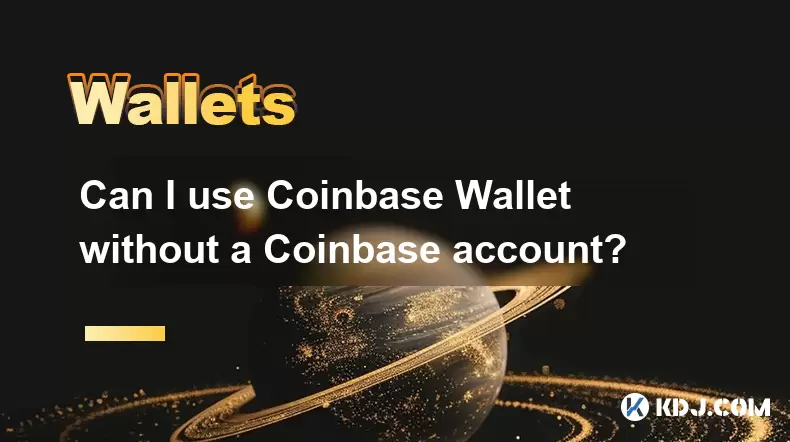
Can I use Coinbase Wallet without a Coinbase account?
Jul 18,2025 at 04:35am
What is Coinbase Wallet?Coinbase Wallet is a self-custodial wallet that allows users to store, send, and receive various cryptocurrencies directly on ...
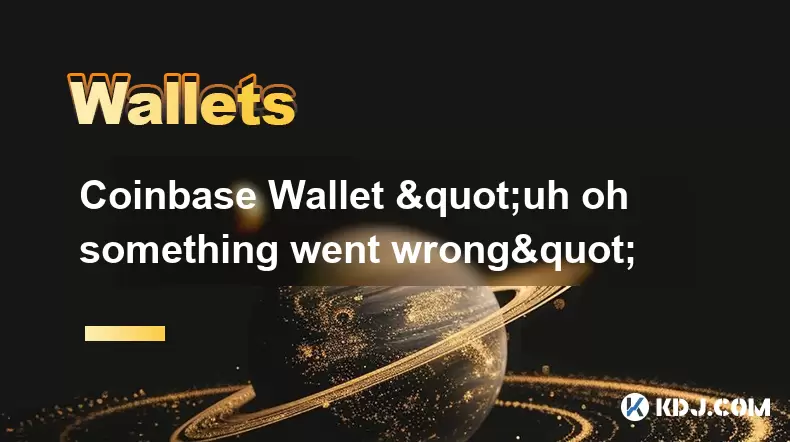
Coinbase Wallet "uh oh something went wrong"
Jul 20,2025 at 10:00am
Understanding the Coinbase Wallet Error: 'Uh Oh, Something Went Wrong'If you're a Coinbase Wallet user, encountering the error message 'Uh Oh, Somethi...
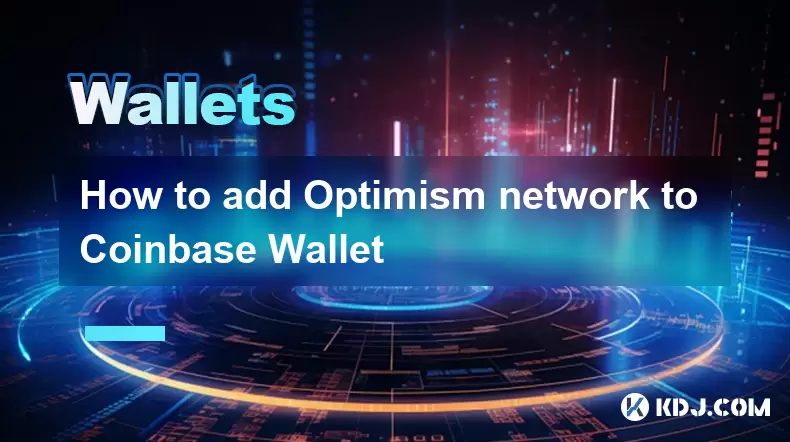
How to add Optimism network to Coinbase Wallet
Jul 20,2025 at 05:21am
What is the Optimism Network?The Optimism network is a Layer 2 scaling solution built on top of the Ethereum blockchain. It aims to enhance transactio...
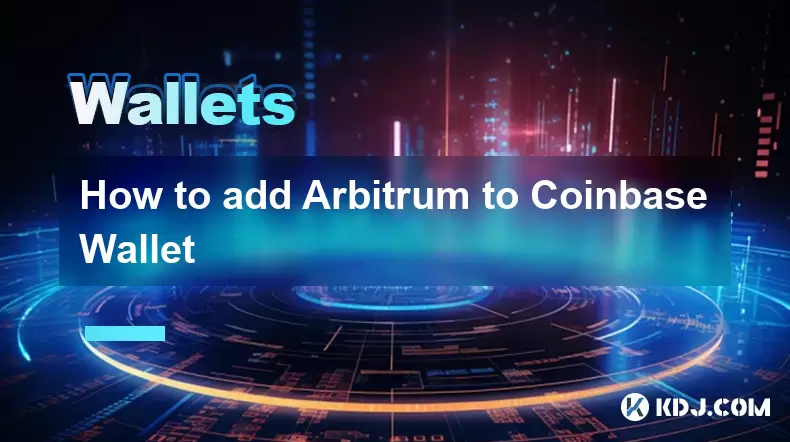
How to add Arbitrum to Coinbase Wallet
Jul 18,2025 at 03:00pm
Understanding Arbitrum and Its Integration with Coinbase WalletArbitrum is a layer-2 scaling solution developed by Offchain Labs to enhance the speed ...
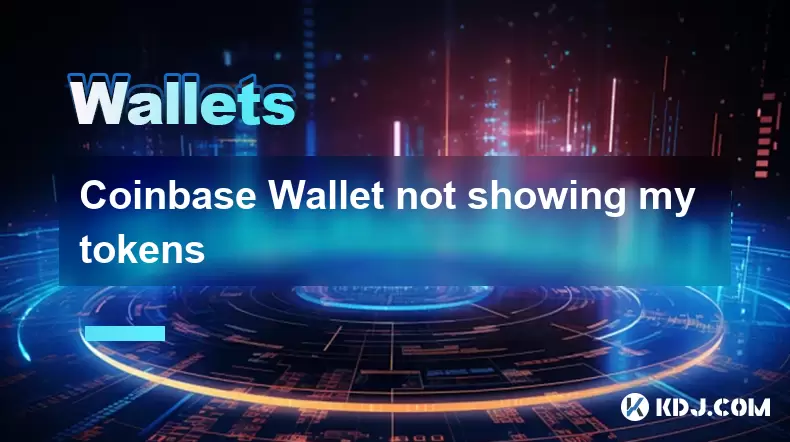
Coinbase Wallet not showing my tokens
Jul 18,2025 at 09:49am
Understanding Coinbase Wallet Token Display IssuesIf you're experiencing issues where Coinbase Wallet not showing my tokens, it can be frustrating, es...
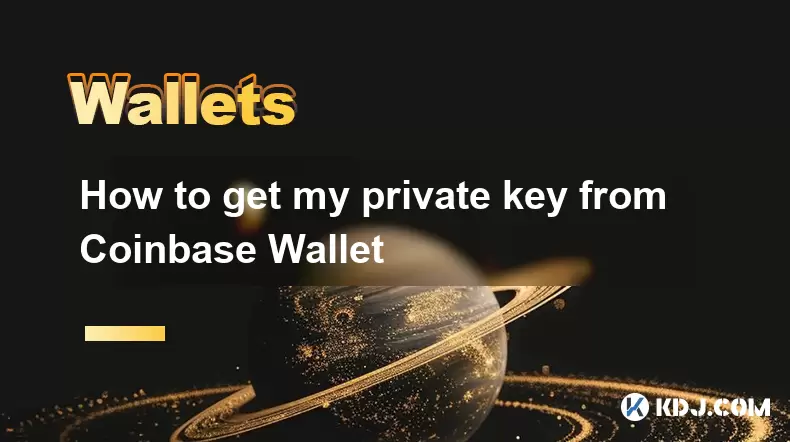
How to get my private key from Coinbase Wallet
Jul 24,2025 at 08:01pm
What Is a Private Key and Why Is It Important?In the world of cryptocurrency, a private key is a unique alphanumeric code that grants you full access ...

Can I use Coinbase Wallet without a Coinbase account?
Jul 18,2025 at 04:35am
What is Coinbase Wallet?Coinbase Wallet is a self-custodial wallet that allows users to store, send, and receive various cryptocurrencies directly on ...

Coinbase Wallet "uh oh something went wrong"
Jul 20,2025 at 10:00am
Understanding the Coinbase Wallet Error: 'Uh Oh, Something Went Wrong'If you're a Coinbase Wallet user, encountering the error message 'Uh Oh, Somethi...

How to add Optimism network to Coinbase Wallet
Jul 20,2025 at 05:21am
What is the Optimism Network?The Optimism network is a Layer 2 scaling solution built on top of the Ethereum blockchain. It aims to enhance transactio...

How to add Arbitrum to Coinbase Wallet
Jul 18,2025 at 03:00pm
Understanding Arbitrum and Its Integration with Coinbase WalletArbitrum is a layer-2 scaling solution developed by Offchain Labs to enhance the speed ...

Coinbase Wallet not showing my tokens
Jul 18,2025 at 09:49am
Understanding Coinbase Wallet Token Display IssuesIf you're experiencing issues where Coinbase Wallet not showing my tokens, it can be frustrating, es...

How to get my private key from Coinbase Wallet
Jul 24,2025 at 08:01pm
What Is a Private Key and Why Is It Important?In the world of cryptocurrency, a private key is a unique alphanumeric code that grants you full access ...
See all articles

























